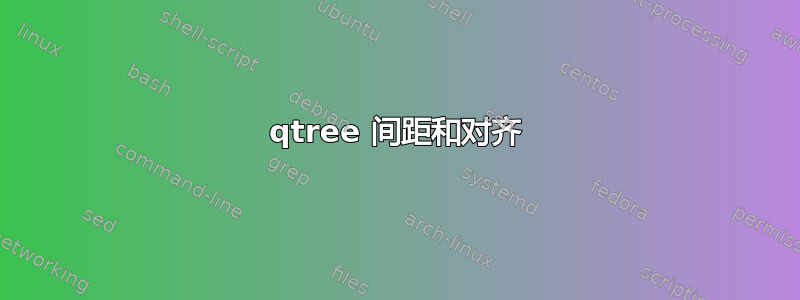
我有以下 qtree
\begin{center}
\Tree[.{\tiny \ttfamily \itseries educated at}{\tiny \ttfamily ( Bush, University of Texas at Austin)} [. [. \textit{\tiny 193938.xml} ]
[. \textit{\tiny sentence 2} ]]
[. [. [. [. \textit{\tiny Q Value} \textit{\tiny University of Texas at Austin} ]
[. [.\textit{\tiny Q Value} ]\textit{\tiny Bush} ] ] ][. [. [. [. \textit{\tiny P26} \textit{\tiny educated at} ]]]]]]
\end{center}
这种对齐确实弄乱了我的论文。
现在它看起来是这样的:

正如您所见,它只是逐渐消失在那里的边缘。
我该如何修复它?
我想,如果我可以将中心分支进一步向上移动,以便右边的分支不会突出太远,那么这可以轻松完成。
更新
\begin{forest}
[{\tiny \ttfamily \itseries educated at}{\tiny \ttfamily ( Bush, University of Texas at Austin)}, qtree edges,s sep=1cm [[\ts{.}] [[[$\epsilon$]]
[$\epsilon$]]][[$\epsilon$]]] \end{森林}
:/ 如何使用森林?
我希望它看起来像这样:

答案1
使用forest包。它比 好得多qtree。而且它旨在精确处理正确的对齐。
答案2
这里有一个forest可以帮助您入门的解决方案。
如果你遇到除以 0 的错误,你需要outer ysep在样式定义中调整值nice trees;这是来自评论的解决方法这个问题有关导致此错误的错误。
\documentclass{article}
\usepackage{forest}
\forestset{
nice trees/.style={
for tree={
parent anchor=south,
child anchor=north,
align=center,
base=top,
inner sep=1pt,
l-=4ex,
before typesetting nodes={
if content={}{
for parent={
for children={anchor=north},
calign=fixed edge angles,
calign angle=60,
},
inner sep=0pt,
outer ysep=-0.49pt,
calign=fixed edge angles,
calign angle=60,
}{},
},
},
},
}
\begin{document}
\begin{forest}
nice trees
[\textsc{Data Representation}\\{\textit{educated at}(Bush, UT Austin)}
[
[filename]
[sentence \# ]
]
[
[
[
[$Q$ value]
[English]
]
[
[$Q$ value]
[English]
]
]
[
[$P$ value]
[English]
]
]
]
\end{forest}
\end{document}

如果实施后树仍然不能水平放置forest,这里有一些问题/答案,提供了几种使其适合的方法:使用 tikz-dependency 进行边距和定位,如何格式化语言树?,减少森林树木宽度但不挤压树木。
我不知道您是否真的希望“数据表示”作为树的顶部节点的一部分,但至少它向您展示了如何使用将\\节点拆分为多行(因为样式允许这样做align=center)nice trees。


